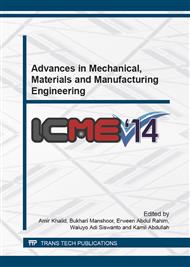p.927
p.932
p.937
p.942
p.949
p.954
p.959
p.966
p.971
The Adoption of Lean and Cleaner Production – A Preliminary Study for Malaysia Manufacturing Industry
Abstract:
Adoption of lean production in managing the production operations with a cleaner production due to of environmental concerns positively drive new manufacturing paradigm in the manufacturing environment. This leads to this study being carried out, in order to investigate the extent of which these practices has been adopted in Malaysia’s manufacturing industry. The finding revealed that good performance in environmental practice in tandem with the appraisal of labour safety in material handling has helped the respondents to successfully sustain the quality and durability of products, improves the operation efficiency, as well as production’s productivity. Aside from that, the correlation test results between all items in LP and CP have a significant positive relationship with each other where the appraisal in the selection of equipment from CP practices have a very strong relationship with the improvement of working conditions that resulted from the adoption of LP practices. These potentially make both practices as the best approach that has potential to be integrated together to support the development of a sustainable manufacturing practice principally in Malaysia’s manufacturing industry.
Info:
Periodical:
Pages:
949-953
DOI:
Citation:
Online since:
October 2014
Keywords:
Price:
Сopyright:
© 2014 Trans Tech Publications Ltd. All Rights Reserved
Share:
Citation:


